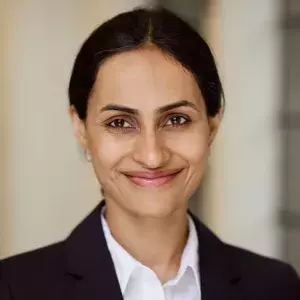Future of cooling
Overview
The Oxford Martin Programme on the Future of Cooling focuses on understanding and shaping sustainable cooling solutions, prioritising passive and less energy-intensive technologies to protect people and prepare countries for extreme heat events.
For billions of people in developing countries cooling is vital for daily comfort, and as heatwaves become more frequent and intense, keeping cool is becoming increasingly important in developed countries. The energy needed for air conditioning is likely to triple by 2050, potentially driving up greenhouse gas emissions and exacerbating the problem it is designed to alleviate.
The Programme's research is led by Associate Professor Radhika Khosla from the Smith School of Enterprise and the Environment as PI, and Professor Malcolm McCulloch of the Energy and Power Group in the Department of Engineering Science as co-investigator. The programme was established in October 2019 to build together the research base, policies, and practical tools to. A non-exhaustive list of our areas of work are:
- Examine the scenarios for future cooling demand globally as the world continues to warm.
- Inform new and more sustainable cooling-related policies through close consultation with decision-makers and policy influencers.
- Analyse new technologies to assess how they meet rising urban energy consumption needs, especially in fast-growing emerging economies.
- Inform governments and communities on how best to prepare for extreme heat events through prioritising passive and less energy-intensive technology, while shifting the trajectory of cooling growth towards sustainable options.
- Assess cooling as a service and the conditions under which business models for cooling are most effective.
- Examine the relationship between extreme temperatures and morbidity
- Promote human-based behavioural and cultural adaptive strategies.
- Examine the role of refrigerant gases in global temperature rise
- Develop sustainable cold chains using phase change material
The Oxford Martin Programme on the Future of Cooling ends in September 2024. For all enquiries on sustainable cooling and heat resilience; please contact Radhika Khosla.
Publications
J. Lizana, S. Wheeler, E. Azizi, C. Halloran, J. Wheeler, D. C. H. Wallom, & M. McCulloch (Jan 2024). Integrated post-occupancy evaluation and intervention that achieve real-world zero-carbon buildings. Energy & Buildings, 303, 113766, https://doi.org/10.1016/j.enbuild.2023.113766
D. Ürge-Vorsatz, R. Khosla et al. (Oct 2022). Advances Toward a Net-Zero Global Building Sector. Annu. Rev. Environ. Resour. Vol. 45:227-269. https://doi.org/10.1146/annurev-environ-012420-045843
J. Lizana, N.D. Miranda, L. Gross, A. Mazzone, F. Cohen, G. Palafox-Alcantar, et al. (Dec 2022). Overcoming the incumbency and barriers to sustainable cooling. Buildings and Cities, Volume: 3 Issue: 1, Pages 1075–1097. https://doi.org/10.5334/bc.255
N.D. Miranda, G. Palafox-Alcantar, R. Khosla, M. McCulloch (Jul 2024). Metrics for the Emissions of F-gas Refrigerants. Sustainable Energy Technologies and Assessments, Volume 58, 103348. https://doi.org/10.1016/j.seta.2023.103348
J. Lizana, N.D. Miranda, S.N. Sparrow, P.A.G. Watson, M. Zachau Walker, D.C.H. Wallom, M.D. McCulloch (Jun 2024). Ensemble of global climate simulations for temperature in historical, 1.5 °C and 2.0 °C scenarios from HadAM4. Scientific Data. 11 578. https://doi.org/10.1038/s41597-024-03400-2
N.D. Miranda, J. Lizana, S. Sparrow, M. Zachau-Walker, P. Watson, D. Wallom, et al. (Jul 2023). Change in cooling degree days with global mean temperature increasing from 1.5o to 2.0oC. Nat Sustain 6, 1716. https://doi.org/10.1038/s41893-023-01207-4
R. Khosla, R. Renaldi, A. Mazzone, C. McElroy, G. Palafox-Alcantar (Sep 2022). Sustainable Cooling in a Warming World: Technologies, Cultures, and Circularity. Annual Review of Environment and Resources, Vol. 47:449-478. https://doi.org/10.1146/annurev-environ-120420-085027
N. Miranda, R. Renaldi, R. Khosla, M. D. McCulloch (Oct 2021). Bibliometric analysis and landscape of actors in passive cooling technologies. Renewable and Sustainable Energy Reviews, Volume 149, 111406.https://doi.org/10.1016/j.rser.2021.111406
R. Khosla, N.D. Miranda, P.A. Trotter et al. (Mar 2021). Cooling for sustainable development. Nat Sustain 4, 201–208. https://doi.org/10.1038/s41893-020-00627-w
R. Khosla et al. (Mar 2021). The what, why, and how of changing cooling energy consumption in urban India. Environ. Res. Lett. 16 044035. 10.1088/1748-9326/abecbc
P. A. Trotter, T. Becker, R. Renaldi, X. Wang, R. Khosla, G. Walther (Oct 2023). The role of supply chains for the sustainability transformation of global food systems: A large-scale, systematic review of food cold chains.Journal of Industrial Ecology, Volume 27, Issue 6, Pages 1429-1446. https://doi.org/10.1111/jiec.13445
G. Palafox-Alcantar, R. Khosla, C. McElroy, N. Miranda (Dec 2022). Circular Economy for Cooling: A Review to Develop a Systemic Framework for Production Networks. Journal of Cleaner Production, Volume 379, Part 1, 134738. https://doi.org/10.1016/j.jclepro.2022.134738
F. Cohen and A. Dechezleprête (May 2022). Mortality, temperature and public health provision: Evidence from Mexico. American Economic Journal: Economic Policy 14 (2): 161–92. https://doi.org/10.1257/pol.20180594
R. Khosla, A. Jani and R. Perera (Oct 2021). Health risks of extreme heat. British Medical Journal 2021;375:n2438. https://doi.org/10.1136/bmj.n2438
F. Cohen, and F. Gonzalez (May 2024). Understanding the Link between Temperature and Crime. American Economic Journal: Economic Policy, 16 (2): 480–514. https://dx.doi.org/10.1257/pol.20220118
A. Mazzone, E. De Cian, G. Falchetta et al. (Sep 2023). Understanding systemic cooling poverty. Nat. Sustain. 6, 1533–1541. https://doi.org/10.1038/s41893-023-01221-6
A. Mazzone, R. Khosla (Jul 2021). Socially constructed or physiologically informed? Placing humans at the core of understanding of cooling needs. Energy Research and Social Science, Volume 77, 102088. https://doi.org/10.1016/j.erss.2021.102088
A. Mazzone (Apr 2020). Thermal comfort and cooling strategies in the Brazilian Amazon. An assessment of the concept of fuel poverty in tropical climates. Energy Policy, Volume 139, 111256. https://doi.org/10.1016/j.enpol.2020.111256
Impact
Over the past five years we have...
- Published 46 peer-reviewed academic papers, policy papers including the cover story in Nature Sustainability in March 2021 Cooling for Sustainable Development, and featured in over 2,600 press articles across 55 countries (three examples below).
- Acted as Special Advisors to the UK’s Environmental Audit Committee inquiry into heat resilience and sustainable cooling, undertaken in response to a presentation from the Future of Cooling team. The Parliamentary report that followed will inform the UK Government’s forthcoming ‘cooling outlook document’, a framework for the UK to be published as part of its commitment to the Global Cooling Pledge.
- Co-authored the Climate Action Pathway for Net Zero Cooling which lays out a vision for action to 2050 and details the main milestones necessary to fully implement the Paris Agreement.
- Lead authored the United Nations Environment Programme’s Global Cooling Watch 2023.
- Drafted a UK Parliament POSTnote, published online, to help inform policy on sustainable cooling and decarbonisation across both UK Houses of Parliament.
- Contributed to the Cool Coalition Working group’s Sustainable Cooling for Cities Handbook.
The Conversation UK: How to make homes cooler without cranking up the air conditioning (July 2023).
The Conversation UK: Northern Europe faces biggest relative increase in uncomfortable heat and is dangerously unprepared – new research, (July 2023).
BBC Ideas: a five-minute video, made in partnership with University of Oxford: Solving the aircon conundrum (July 2023).
Education & engagement
Leading academics in the Future of Cooling programme play a vital teaching role on the Smith School’s MSc in Sustainability, Enterprise and the Environment, helping to train the next generation of thought leaders in the transition to net-zero.
We are developing executive education initiatives on climate action, working with corporations and business leaders to encourage responsible decision-making, and to shape the market now and in the future, focused on the areas that can deliver a sustainable future.
Online course in Sustainable Cooling: Building Resilience to Extreme Heat
Our sustainable cooling online course is designed to equip students with the skills and knowledge needed to implement sustainable cooling solutions and drive the transition towards a more positive future for people and the planet.
Autumn 2021 webinar series
- 13 September 2021: Jim Maguire and Richard Matsui talk: Finance, insurance and sustainable cooling
- 20 September 2021: Janet Stephenson & Russell Hitchings talk: Social Interactions and Cooling Cultures
- 27 September 2021: Iain Campbell & Diana Ürge-Vorsatz talk: Cooling Technology and Innovation
- 04 October 2021: Nnaemeka Ikegwuonu & Toby Peters talk: Models for Sustainable Cold Chains
- 11 October 2021: Martin Dieryckx & Dave Mackerness talk: Circular Cooling Economy
- 18 October 2021: Amory Lovins & Madeleine Edl talk: Infrastructure Design for Sustainable Cooling
- 25 October 2021: Tracey Crowe & Kate Hughes talk: Cooling for Climate Action
Partners
Our main partners are the Programme team based at the Oxford Martin School.
Our team
Dr Radhika Khosla leads the Smith School cooling team
Oxford Martin School team
- Malcolm McCulloch | Professor, Engineering Science
- Rafael Perera | Professor of Medical Statistics
- Antonella Mazzone | Honorary Research Fellow
- Nicole Miranda | Oxford Martin Fellow
- Jesus Lizana | Associate Professor, Engineering Science
- Patrick Fahr | Postdoctoral Researcher
- Khoa Le | Postdoctoral Researcher
- Nethmi Jayaratne Kariyawasam | Doctor of Philosophy (DPhil) in Geography and the Environment
- Jessica Schiff | Doctor of Philosophy (DPhil) in Primary Care Health Sciences
Latest news
The Most Efficient Way to Run Your AC During a Heat Wave
Parts of America are currently suffering from a stifling heatwave. Dr Radhika Khosla raised the issue of overreliance on air conditioning in an article for Time Magazine. "Air conditioners are not the most climate friendly solutions because they're extremely energy intensive... they're so energy guzzling, they place quite a large strain on the [fossil fuel] electricity grid," she said.
The Most Efficient Way to Run Your AC During a Heat Wave
As temperatures rise, Dr Radhika Khosla warned Time readers about the problems of over-relying on air conditioning. "Air conditioners are not the most climate friendly solutions because they're extremely energy intensive, they use a whole order of magnitude more electricity than fans, and because they're so energy guzzling, they place quite a large strain on the [fossil fuel] electricity grid,” she said.
Why executive education is booming in Saudi Arabia
The FT covers the Smith School's bespoke courses for the region, which have seen increased demand linked to recognition of the urgency of climate adaptation strategies in the region and cover topics such as carbon capture, resilience to extreme heat, and sustainable cooling.





